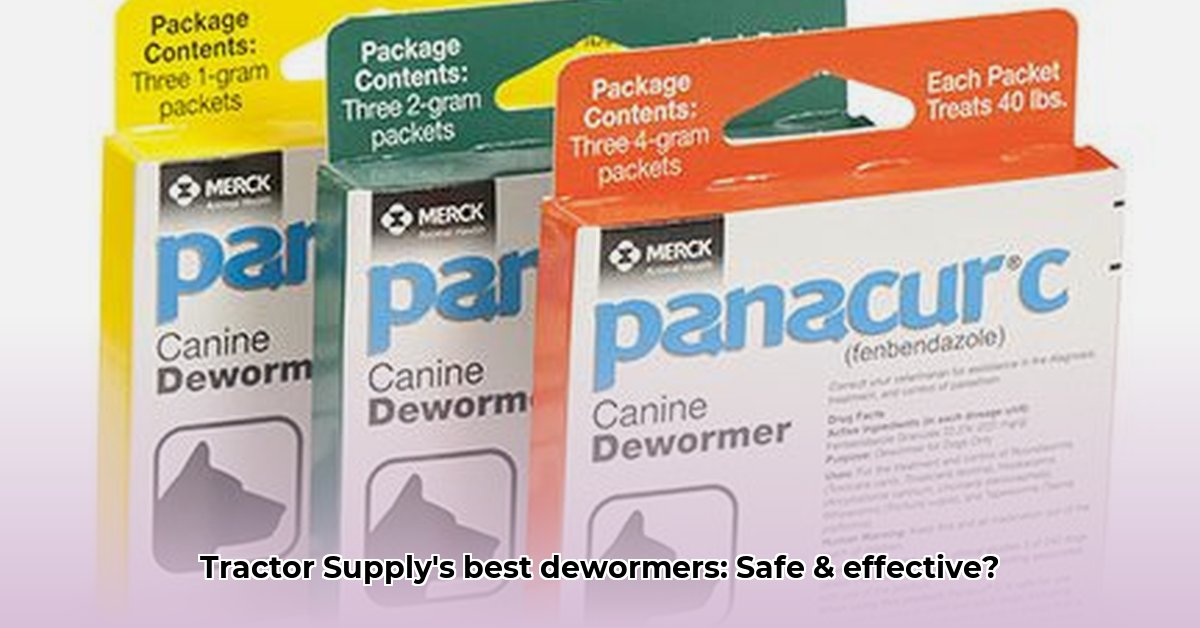
Canine Dewormer Tractor Supply: Your Guide to a Happy, Healthy Pup
Keeping your canine companion healthy involves regular preventative care, and deworming is a crucial aspect. Worried about finding the right dewormer for your dog? Tractor Supply offers a range of options, but choosing the right one requires careful consideration. This guide simplifies the process, ensuring your furry friend stays happy and healthy. For optimal dog health, consider supplementing with high-protein dog food.
Understanding Canine Parasites
Dogs, just like humans, can be affected by intestinal parasites. These unwelcome guests can deplete nutrients, leading to lethargy and illness. Regular deworming is vital for preventative care, and Tractor Supply provides convenient access to various dewormers. But how do you know which one is right for your dog?
Choosing the Right Dewormer: A Tailored Approach
Selecting the appropriate dewormer hinges on several factors. Your dog's weight is paramount for accurate dosage and safety. Their age also plays a role, as puppies may require different dewormers than adults. Finally, identifying the specific parasite (roundworms, hookworms, tapeworms, etc.) is crucial. A fecal examination by your veterinarian is the most reliable method for accurate diagnosis.
Here's a simplified comparison of common dewormer types:
| Dewormer Type | Active Ingredient | Targeted Parasites | Considerations | Availability at Tractor Supply |
|---|---|---|---|---|
| Broad-Spectrum | Pyrantel Pamoate | Roundworms, Hookworms | Generally safe; may cause mild digestive upset. | Usually available |
| Tapeworm Treatment | Praziquantel | Tapeworms | Often combined with other dewormers; vet consultation recommended. | Availability may vary |
Important: This table is for informational purposes only. Always consult your veterinarian before administering any dewormer to your dog. Product availability may vary; check your local Tractor Supply for current offerings.
Administering the Dewormer: A Step-by-Step Process
- Read the Label: Carefully review the dosage instructions based on your dog's weight. Accuracy is key!
- Prepare Your Dog: Ensure a calm and comfortable environment. A treat can be helpful.
- Administer the Dewormer: Follow the instructions precisely – whether it's a tablet, liquid, or topical application.
- Monitor Your Dog: Observe your pet for several hours after administration. Watch for unusual behavior.
- Contact Your Vet: If you notice any adverse reactions (vomiting, diarrhea, lethargy), contact your veterinarian immediately.
Safety Precautions and Potential Side Effects
While generally safe, dewormers can cause mild side effects like vomiting or diarrhea. These are usually temporary. Serious reactions are rare but possible. Always consult your vet, especially if your dog has pre-existing health conditions. Never exceed the recommended dosage.
Keep dewormers out of reach of children and other pets. Proper storage and disposal are vital.
Frequently Asked Questions (FAQs)
Q: Can I use human dewormers on my dog? A: No! Human dewormers are toxic to dogs.
Q: How often should I deworm my dog? A: This depends on your dog's lifestyle and risk factors. Your veterinarian can provide a personalized schedule.
Q: My dog vomited after taking the dewormer. What should I do? A: Contact your veterinarian immediately.
Beyond Dewormers: Proactive Parasite Prevention
Regular deworming is crucial, but preventative measures are equally important. Good hygiene (cleaning up after your dog), environmental management (limiting exposure to feces from other animals), and a balanced diet contribute to a healthier, parasite-free pup. Remember, your veterinarian is your best resource for personalized advice and long-term preventative care. Tractor Supply offers convenient access to dewormers, but your vet remains your primary partner in ensuring your dog's well-being.